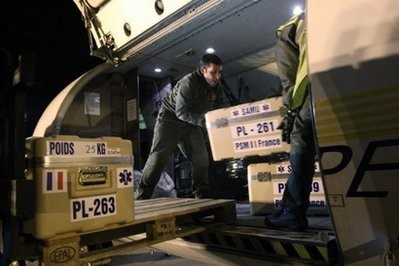BRUSSELS (AFP) – NATO and EU ministers are to meet to lay out options to deal with Libya's Moamer Kadhafi as leaders ponder military and economic options to resolve the crisis in oil-rich Libya.
The meeting will bring together defence ministers, foreign ministers and prime ministers or presidents for talks Thursday and Friday that will shape the prospects for military intervention via a no-fly zone, humanitarian aid and economic props.

"The policy is getting him to go as soon as possible," said a senior EU diplomat of Colonel Moamer Kadhafi, the one-time pariah whose rehabilitation by Britain, France, Italy and others is now the subject of global hand-wringing.
"No one is expecting Kadhafi will melt away in the next few days, but we are developing a range of responses," added the source, who requested anonymity.
The stakes are high, with oil prices flying and the prospect of a flood of migrants crossing from north Africa into Europe uppermost in the minds of many.
For the United States and its leading allies, surviving a political tightrope with the fast-changing Muslim world near tops the list.
The EU's 27 foreign ministers start the ball rolling in mid-morning when they arrive for talks preparing a full summit of leaders the next day.
Britain and France are lobbying for a United Nations Security Council imprimatur for a no-fly zone. But anxious Washington wants any military action conducted under the banner of the North Atlantic Treaty Organisation, with Arab regional backing seen there as essential.
"Some think this could protect civilians from aerial bombardment, others fear risks in terms of how it would play with Arab public opinion," said a top EU official who asked not to be named.
On the headline initiative of enforcing a no-fly zone over a country vaster than restricted air exclusion areas over Iraq or the Balkans in past conflicts, "countries are divided" too over the operational input of a military engagement, added the source.
The meetings follow a flurry of diplomatic activity that Wednesday saw Tripoli send envoys to Europe, after Libyan rebels lobbied the European Parliament, and French Foreign Minister Alain Juppe wooed support from China, the United Arab Emirates and Jordan.
The talks move across to NATO headquarters in the afternoon as the alliance's 28 defence ministers gather for a presentation on the military options from US Admiral James Stavridis, NATO's supreme allied commander in Europe.
Top officials from the United States and Britain stress that a decision will not be taken until a "demonstrable need" to use force to evict Kadhafi and a UN resolution or another "clear and proper legal basis" are each established.
Washington "believes that NATO is the natural choice for any military action," but at the other end of the spectrum, while Turkey signed up to planning, Ankara has described the alliance going in as an "absurd" prospect.
In Paris a French diplomat said that "alongside Britain, we are working on what could be done without NATO. The sight of the NATO flag would be provocative."
Kadhafi played directly to such sentiments this week, saying "the colonialist countries are hatching a plot to humiliate the Libyan people, reduce them to slavery and control the oil."
Libyan oil output has dived by two thirds since the crisis erupted.
The baton passes on Friday to EU leaders -- when British Prime Minister David Cameron and French President Nicolas Sarkozy will provide the bridge to Obama.
Sarkozy will Thursday meet envoys of Libya's rebel national council, but Italian Foreign Minister Franco Frattini maintained that "the Libyan regime is moving towards contact" with the international community and a senior aide to Kadhafi arrived in Cairo.
EU leaders may not have the stomach to confer legitimacy at this stage on the newly set-up opposition national council, but a consensus for tighter economic sanctions appears to be in the air.
























